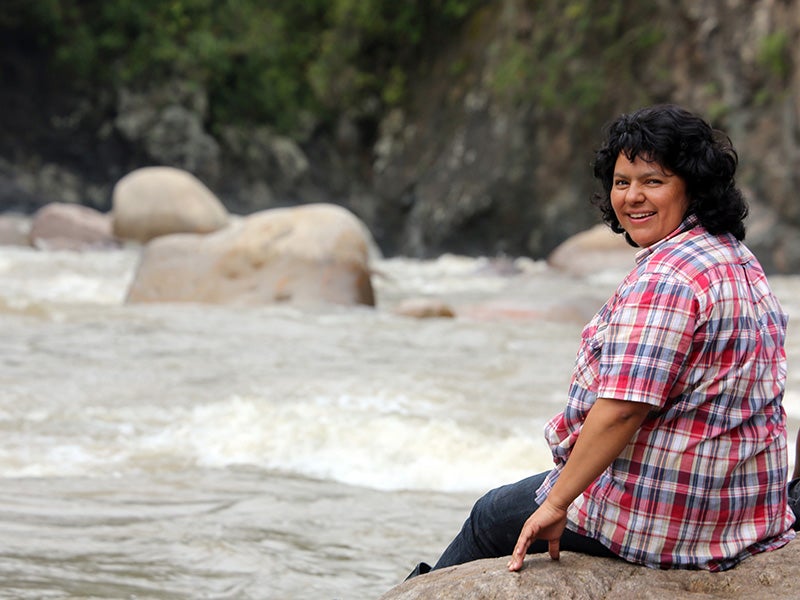Who Protects the Protectors like Berta Cáceres?
The brutal murder of Honduran indigenous and land rights defender Berta Cáceres brings into focus the dangers that activists face worldwide.

This page was published 9 years ago. Find the latest on Earthjustice’s work.
Editor’s Note
On March 15, 2016, less than two weeks after the murder of Berta Cáceres, Nelson Garcia, also a member of the indigenous Lenca people of Honduras and an outspoken member of COPINH, was murdered by unidentified gunmen near his home. Garcia’s murder re-affirms the dire situation in Honduras facing these activists and reflects a systematic effort to silence the right to protest within the country. The Honduran government must immediately comply with its human rights obligations by taking all necessary steps to protect these defenders and to investigate and bring to justice the perpetrators of these senseless and brutal acts.
In the early hours of March 3, 2016, gunmen forcibly entered a home where Berta Cáceres, a well-known Honduran indigenous and land rights defender, was staying in La Esperanza, Honduras, and brutally murdered her. Cáceres’ inspirational leadership created and sustained one of the country’s most powerful grassroots social and environmental justice movements. Her murder, though shocking and devastating, was not surprising.
In 1993, Cáceres, a member of the indigenous Lenca people of Honduras, co-founded the National Council of Popular and Indigenous Organizations of Honduras (COPINH) to advocate for indigenous peoples’ right to their lands and resources. In 2003, at the request of community members from Rio Blanca, COPINH began a campaign, spearheaded by Cáceres, against the proposed massive Agua Zarca hydro-electric dam in the Gualcarque River basin. Through a remarkable domestic and international campaign, COPINH has managed to stall the project until now. In 2015, Cáceres received the prestigious Goldman Environmental Prize in recognition of her work.
But this campaign has not come without its dangers. Cáceres, her fellow campaigners and the communities involved have received countless threats and faced many acts of violence, repression and intimidation. In an eerie foreshadowing of her murder, the 2015 Goldman Prize profile of Cáceres explained: “What haven’t stopped are death threats to Cáceres. Her murder would not surprise her colleagues, who keep a eulogy—but hope to never have to use it.”
Unfortunately, Cáceres’ assassination is not an isolated problem in Honduras or throughout the world. Environmental and land defenders are among the most threatened groups of people on Earth. A 2015 report by Global Witness estimated that between 2002 and 2014, at least 908 land and environmental activists were killed worldwide—109 in Honduras alone. Even more troubling, Global Witness estimated that of these 908 murders, only 10 perpetrators are known to have been tried, convicted and punished. And as Global Witness acknowledges, these statistics almost certainly underestimate the scale of the problem. In many cases, information regarding the murders of land and environmental defenders is not available. Nor do these figures include the innumerable threats and other physical abuse confronting these activists. The main driver of this level of violence against environmental and land defenders is that they are usually seeking to disrupt the flow of money to powerful and well-connected interest groups. Due to systemic corruption, local police and government officials often turn a blind eye to illegal acts, and in many cases also act as the perpetrators of violence.
However, the law protecting environmental and land defenders is clear. Countries are obligated under international human rights law to respect and protect the rights to freedom of expression and assembly. As the United Nations Special Rapporteur on human rights and the environment has explained, nations also have obligations to “protect the life, liberty and security of individuals exercising those rights.” In addition, the 1998 United Nations Declaration on the Protection of Human Rights Defenders says that nations have a duty to prevent threats, assaults and harassment, to investigate and respond to threats or acts of violence and, where appropriate, to punish those responsible and provide an adequate remedy for victims. The declaration, though not binding in the same way a treaty is, was approved unanimously by the UN General Assembly and reflects widely accepted legal norms.
The problem is that governments are systematically failing to carry out their obligation to guarantee the human rights of environmental and land defenders. Honduras, in particular, appears to be failing miserably. Global Witness has concluded that Honduras is the second most dangerous country in the world for environmental and land defenders, after Brazil. In the case of Cáceres, just last year the Inter-American Commission for Human Rights requested that the government take measures to ensure Cáceres’ safety. Yet, even though the government was supposed to be providing Cáceres with police protection, her protection detail was mysteriously absent the night of her murder.
Until governments around the world take seriously their obligation to protect land and environmental defenders, many more acts of intimidation, threats and deaths will take place. But it is also incumbent on all of us to carry on the legacy of Cáceres and the countless other land and environmental defenders who have been killed or who continue to risk their lives daily in their struggle for justice. The international community must coordinate its efforts to better raise awareness of the dire situation land and environmental defenders face and to implement strong and effective protections.
As Cáceres said, “Our Mother Earth—militarized, fenced-in, poisoned, a place where basic rights are systematically violated—demands that we take action.”
In memory of Berta Cáceres: 1971-2016
The International Program partners with organizations and communities around the world to establish, strengthen, and enforce national and international legal protections for the environment and public health.